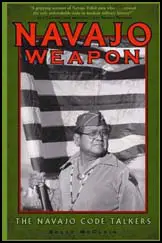Merril Sandoval

Merril Sandoval was born on Navajo Reservation in 1924. He joined the U.S. Marines on the outbreak of the Second World War. He later explained why so many Navajos joined the the armed forces. "There was no question we'd fight. We understood all about people taking land from us. That was what was happening over there."
In May 1942 Sandoval was recruited to become part of the Navajo Code Talking program at Camp Pendleton at Oceanside, California. An estimated 400 Navajos agents were trained to use the code and around 300 saw action in the field. Speaking Navajo and using an additional code within that, they were able to convey information and orders among Marine units and Navy warships and aircraft. The Code Talkers served in all six Marine divisions, Marine Raider battalions and Marine parachute units. The Code Talkers were a part of every major Marine assault during the Second World War and first saw action on 7th August 1942 when the marines landed on Guadalcanal.
Sandoval was sent with the marines that invaded Japanese held Iwo Jima on 19th February, 1945. Sandoval's job was to stay behind the frontline and translate reports from two-man code talker teams elsewhere on the island. Sandoval then sent back these messages to military commanders based on Hawaii. Sandoval was also responsible for passing on orders to the U.S. Marines on the frontline.
Some senior officers believe that the contribution of the Navajo code played an important role in the success of the operation as the Japanese had already broken the codes of the United States Army and the United States Air Force. Major Howard Connor, a 5th Marine Division signals officer, later argued: "Were it not for the Navajos, the marines would never have taken Iwo Jima."
Being a Navajo Code Talker was a dangerous occupation. According to Sandoval, Navajo soldiers were at great risk from being shot in battle by their own side: "Those city kids had no idea. On the frontline, some of them mistook us for Japanese."
Sandoval and his team of code talkers fought throughout the Pacific campaign and were with the U.S. Marines when they arrived in Japan in September 1945.
After the war Sandoval had difficulty finding work. "When I got out of the army, I coudn't even get a job. They asked what I'd done in the war, but I could not talk about it."
The role of the Navajo code breakers was kept a secret until 1968. It was claimed that the main reason for this was that the military might want to use the code again after the war. Another factor might have been because the government had for many years been involved in trying to destroy the Navajo language. For example, during the Second World War, while the Code Talkers were risking their lives on the frontline, back home, Navajo children were being punished at reservation schools for speaking their native language.
Primary Sources
(1) Merrel Sandoval, interviewed by Tom Otley of the Sunday Times about landing on Iwo Jima in February 1945 (25th August 2002)
Looking back, I don't think I was even scared. When you are young you don't think much about what's going to happen. "Kill or be killed', that's what the training had instilled in us. I was just thinking it was like a film.
The landing was terrible. The surf was really rough and the beach was steep, so when the landing craft didn't hit straight on they turned over. In the end we had to dump all our gear, including the radios, and swim ashore or we would have drowned.
(2) Merrel Sandoval, interviewed by the Arizona Republic newspaper about the film Windtalkers (9th June 2002)
What was said (in the film) was pretty close. I wouldn't say it was perfect, but it's pretty close to our code. There are a lot of things that are missing, but I guess that's the way they make movies.
Last updated: 25th August, 2002.
